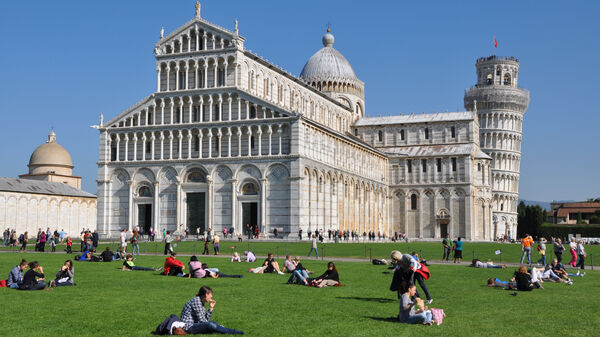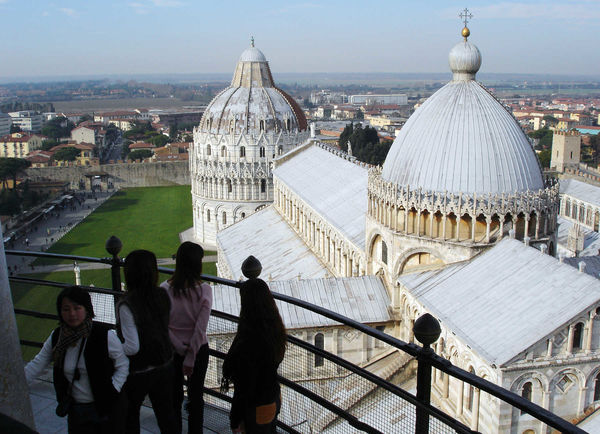Lean In to Pisa
By Rick Steves

An easy day trip from Florence, and famous solely as the home to a tipsy tower, most of Pisa is ignored by its hordes of visitors. But if you have time for more than a touristy quickie, stick around to savor Pisa's rich architectural heritage and fun college-town energy.
Understandably, every first-time visitor heads straight to the Leaning Tower of Pisa, one of the most iconic structures in the world. It stands — sort of — near the town's other biggies, Pisa's cathedral and baptistery. This creamy white threesome floats regally over a piazza largely covered in a lush lawn. Each time I stand there, I like to pretend I'm arriving in Pisa as a sailor in the 11th century, when the sea came to just outside the surrounding walls and Pisa's cathedral was the biggest church in the world. To see this ensemble of gleaming white marble spread out before you is impressive no matter when and how you get here. Even choked with street-market stands probably then and certainly now, the square still lives up to its name: the Field of Miracles.
Soon after construction of the bell tower began in 1173, someone said, "Is it just me, or does that look crooked?" The builders carried on anyway, using every trick imaginable to stop the slant. But the top of the 200-foot tower nevertheless wound up tilted off its base by 15 feet. In 1990, the tower was deemed dangerous, and the city sealed it up and spent the next decade straightening it by about six inches. All that work turned the clock back a few centuries, and the tower now leans about as much as it did when Galileo reputedly conducted his gravity experiments from the tower 400 years ago.
Climbing to the top of the tower is an unforgettable experience, offering great views…and vertigo. Since only 50 people can ascend every 15 minutes, you reserve a time slot when you buy your ticket (it's smart to book ahead online). If you show up in Pisa without a reservation, go straight to the ticket office on arrival, as spots aren't likely to be available within the next few hours — especially in summer. (If you'll be seeing both the town and the Field of Miracles, plan on a six-hour stop. If you're just blitzing the Field of Miracles and have already booked a tower-climb time, your visit will still take at least three hours.)
With its ornate facade glittering in the sun, Pisa's huge and richly decorated cathedral is artistically more important than the tower. The highlight of its interior, Giovanni Pisano's exquisitely carved pulpit, is almost overwhelmingly dense with figures depicting the story of Jesus' life. Next to the cathedral, the baptistery features acoustics so remarkable that echoes last long enough to let you sing three-part harmony — solo.
For most visitors, the Pisan thrill ends here. But when I'm in Pisa, I take time to escape the tourist crowds with a stroll through town.
Pisa straddles the Arno River, just six miles from the coast — when the wind blows right, you can smell the sea air. Centuries ago, Pisa was a major trading power, rivaling Venice and Genoa for control of the seas. Long lines of elegant mansions line the riverfront at the heart of town, reminiscent of Venice's Grand Canal.
After its port silted up, Pisa was left high and dry, and eventually entered a period of steady decline…leaving its grand landmarks as reminders of its past glory.
For many, the lack of tourists outside the Field of Miracles is both a surprise and a relief. Nearly half of Pisa's 100,000 residents are students, keeping the city lively — especially at night. Pisa's university, one of Europe's oldest, was where Galileo studied the solar system and Andrea Bocelli attended law school before embarking on his musical career. Young Pisans strut in their fashionable stuff along Corso Italia, Pisa's main drag, where the kids are out making the scene. Some are also making out like thieves — be on guard for young pickpockets, often dressed as tourists.
A church on Corso Italia sports some 16th-century graffiti. Odds are you'll probably spot some modern graffiti nearby. Students have been pushing their causes here — or simply defacing things — for five centuries. Near the train station, a mural covering the wall of a church vibrates with life. Painted in 1989 by American graffiti artist Keith Haring, this colorful assembly of figures celebrates diversity, chaos, and the liveliness of our world.
Considering Pisa's historic importance and the ambience created by its rich architectural heritage and vibrant student population, the city deserves at least a half day. While Pisa is rewarding even on a shorter visit, lingering here and exploring the medieval city center helps you round out your Tuscan experience.

